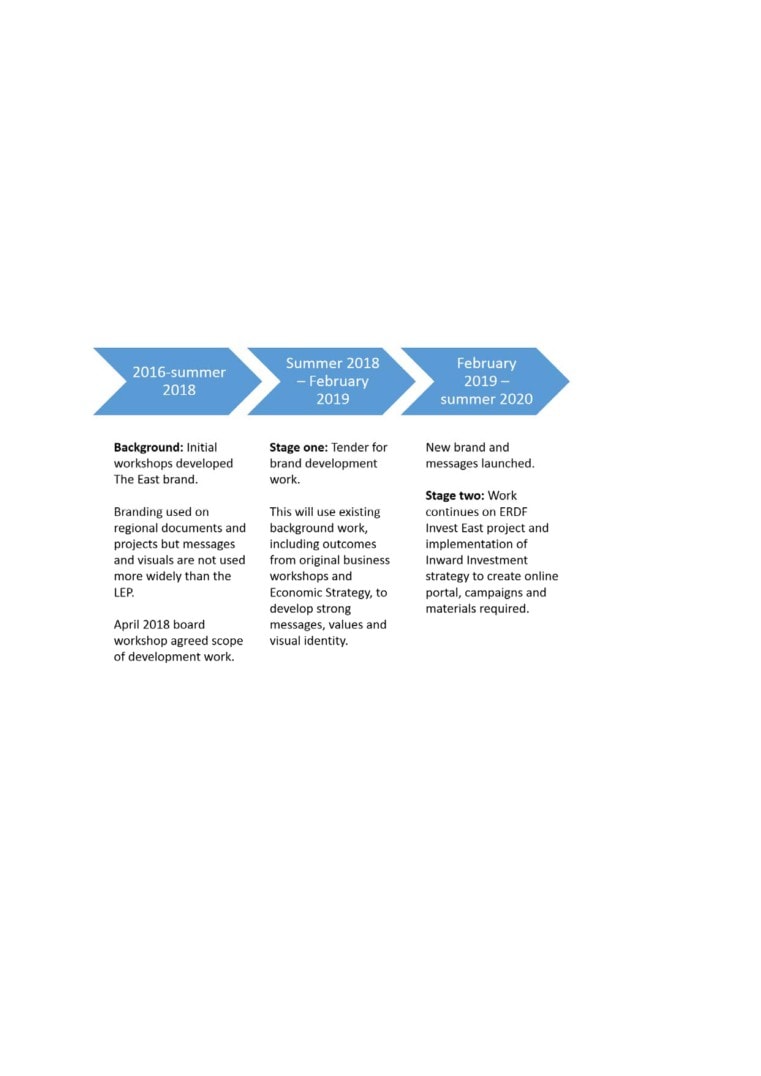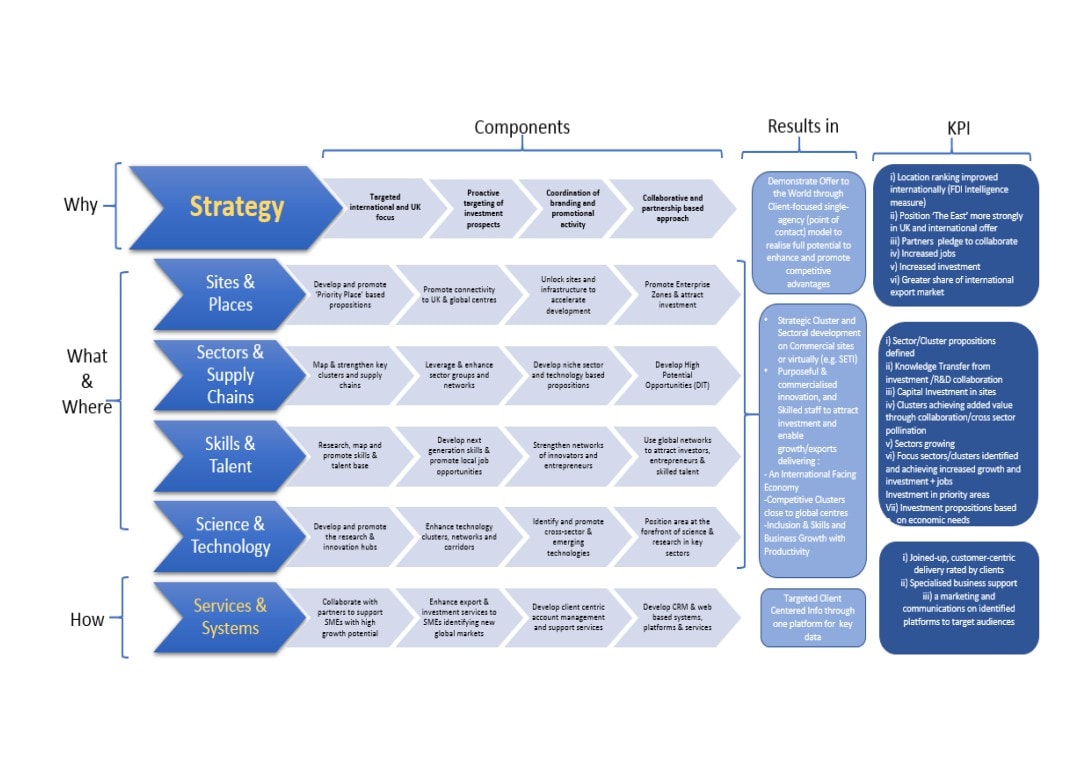New Anglia Local Enterprise Partnership Board Meeting
Wednesday 20th June 2018
10.00am to 12.30pm
The Council House, University of East Anglia, Norwich
Agenda
No.
Item
Duration
1.
Welcome
20 mins
2.
Apologies
3.
In Memorium - Minute’s Silence for Cliff Jordan
4.
Declarations of Interest
5.
Introduction - David Richardson
6.
Actions / Minutes from the last meeting
Forward Looking
45 mins
7.
Place Branding
For Approval
8.
Inward Investment
For Approval
9.
Skills
Update
Governance and Delivery
15 mins
10.
Enterprise Adviser Network
For Approval
Break
10 mins
Governance and Delivery
60 mins
11.
Local Energy Strategy
For Approval
Capital Growth Programme: Honingham Thorpe Food Enterprise Park
12.
For Approval
- Confidential
13.
Revenue Funding Framework
For Approval
14.
Growth Deal Quarterly Dashboard
For Approval
15.
Chief Executive’s Report
Update
16.
Finance Report including Confidential Appendices
Update
17.
Board Forward Plan
Update
18.
Any Other Business
Update
Next Meeting: 10.00am - 12.30pm, 19th September 2018
Venue:
Aviation Academy, Anson Road, Norwich
1
New Anglia Board Meeting Minutes (Unconfirmed)
23rd May 2018
Present:
Cllr David Ellesmere (DE)
Ipswich Borough Council
Doug Field (DF)
East of England Coop
John Griffiths (JG)
St Edmundsbury Borough Council
Dominic Keen (DK)
High Growth Robotics
Colin Noble (CN)
Suffolk County Council
Andrew Proctor (AP)
Broadland District Council
Johnathan Reynolds (JR)
Nautilus
Sandy Ruddock (SR)
Scarlett & Mustard
Alan Waters (AW)
Norwich City Council
Jeanette Wheeler (JW)
Birketts
Tim Whitley (TW)
BT
In Attendance:
Alison Thomas (AT)
Norfolk County Council (For Cliff Jordan)
Richard Lister (RL)
University of Suffolk (For David Richardson)
Corrienne Peasgood (CP)
Norwich City College (For Nikos Savvas)
Sue Roper (SuR)
Suffolk County Council
Vince Muspratt (VM)
Norfolk County Council
Shan Lloyd (SL)
BEIS
Chris Dashper (CD)
New Anglia LEP
Ellen Goodwin (EG)
New Anglia LEP (For Item 5)
Julian Munson (JM)
New Anglia LEP (For Item 6)
Chris Starkie (CS)
New Anglia LEP
Helen Wilton (HW)
New Anglia LEP
Rosanne Wijnberg (RW)
New Anglia LEP
1
3
Actions from the meeting: (23.05.18)
Item 6 Enterprise Zones
To receive further information on the make up of jobs on EZs and the rationale for companies
JM
moving into the zones.
1
Welcome from the Chair
Doug Field (DF) welcomed everyone to the meeting and including Corrienne Peasgood deputising for
Nikos Savvas and Richard Lister deputising for David Richardson.
DF asked Alison Thomas (AT) to pass on the best wishes of the Board to Cliff Jordan.
DF welcomed Board members to the Coop Education Centre and introduced a short film celebrating 150
years of the Coop.
2
Apologies
Apologies were received from: Cliff Jordan, Steve Oliver, David Richardson, Lindsay Rix and Nikos
Savvas
3
Declarations of Interest
Item 8 Capital Growth Programme Projects
Projects recommended for Rejection
Colin Noble, Corrienne Peasgood, Richard Lister, Sue Roper
Projects recommended for Approval
Alan Waters, Andrew Proctor, Alison Thomas and Vince Muspratt.
Attendees were reminded that all Board deputies would be required to complete a Register of Interests
Form.
4
Minutes of the last meeting 18th April 2018
The minutes were accepted as a true record of the meeting held on 18th April 2018.
Actions from last meeting updated as follows:
Chief Executive’s Report
HM
To receive regional branding examples from Hayley Mace - Complete
Institute of Technology
An IoT brochure is being completed and will be circulated to Board members when available -
HM
More copies of the brochure are being printed but PDF versions of the document are available
for Board Members at the meeting - Complete
Chris Starkie (CS) reviewed the updates to the action log and advised that he had written to the
Combined Authority and is now liaising over a paper which will go to the June Combined
Authority Board meeting.
5
Integrated Transport Strategy
Ellen Goodwin (EG) provided the Board with details of the work carried out to date to produce
the Integrated Transport Strategy and the next steps in the approval process.
The strategy has been endorsed by Norfolk and Suffolk County Councils and, subject to minor
amendments requested by both Councils, will progress to proofing and then publication.
A delivery plan will be produced and presented at the September Board meeting.
The meeting discussed the strategy and noted that projects should be prioritised in order to
achieve the most deliverables. The strategy should also link in to Transport East’s plans.
Johnathan Reynolds (JR) suggested that the strategy should link to the sector plans and also
be more explicitly tied in with the Energy Strategy.
2
4
The Board agreed:
To note the content of the report
To adopt the Integrated Transport Strategy
To support the next steps in the strategy
6
Enterprise Zones
Julian Munson (JM) provided the Board with a presentation on the background to the current
Enterprise Zones (EZs) and their achievements to date.
The Board was advised that work is ongoing on the development of an inward investment
delivery plan which will include EZs as part of the region’s attraction to businesses.
DF asked what level of LEP resource was required to support the EZs. JM confirmed that two
full-time and one part-time member of the LEP executive managed the EZs with additionally 50
per cent of JM’s time. Significant additional resource was also provided by local authority
partners. A service charge to Local Authorities was in place to cover the LEP’s costs.
It was noted that additional resource may be required in future for lead generation.
Jeanette Wheeler (JW) advised the meeting that Birketts was about to move into their new
building on an EZ and stressed the quality of the site. The Board was invited to hold a future
meeting at the office.
The meeting discussed the importance of understanding numbers of new jobs created, whether
they were truly additional or just sustaining existing employment, and those which have just
relocated when a company moves onto an EZ.
The Board agreed that the issue of job displacement needed to be understood more fully and
asked for analysis on new and sustained jobs. This analysis should also include the
company’s motives for moving.
AP asked about the spending plans for the income from the EZs.
JM noted there is a delivery plan for each site using Pot B funds. CS advised that the Pot C
revenue is funding available to be invested by the LEP and that a proposal for using this money
would be presented at the June Board.
Tim Whitley (TW) requested further detail of investment already carried out in the region which
would support marketing of the East and demonstrate the extent of historical and ongoing
investment in the region.
John Griffiths (JG) stressed the importance of highlighting successful case studies.
The Board agreed:
To note the content of the presentation
To endorse the approach to inward investment and forward plan.
To receive further information on the make up of jobs on EZs and the rationale for
JM
companies moving into the zones.
7
West Suffolk College Engineering Centre 2nd Phase
Chris Dashper (CD) presented the paper on the Engineering and Technology Centre at West
Suffolk College and requested approval from the Board on the recommendation of the
Investment Appraisal Committee
(IAC) to release of the remaining
£3 million for the
refurbishment of part a building in order to create a new Engineering and Technology Centre.
The Board agreed:
To note the content of the report
To approve the release of £3m to fund the 2nd Phase of the West Suffolk College
Engineering Centre
8
Capital Growth Programme Projects
CD reviewed the assessment process carried out to date on those projects which had provided
further information as part of the latest call.
A number of projects had chosen to withdraw from the process.
3
5
The Board was advised that the remaining projects had been then been divided into three
categories - Recommend Rejection. Recommend Approval and Recommend Approval as an
award from the Growing Places fund.
The meeting then reviewed each group of recommendations in turn.
Recommendations for Rejection
Colin Noble (CN), Corrienne Peasgood (CP), Richard Lister (RL) and Sue Roper (SuR) left the
room.
CS advised that these projects, whilst recommended for rejection, would be able to reapply at
the future call.
CD confirmed that all rejected projects would receive a full response and would be advised
when a future call take place. They would be also given feedback on the appraisal carried out.
David Ellesmere (DE) advised that the LEP’s Investment Appraisal Committee had met prior to
the Board meeting on 23rd May to review the recommendations.
The committee supported all the recommendations bar one.
He outlined that the IAC has agreed that The Hold Project should be awarded £250k from the
Growing Places Fund, which is in line with similar cultural and heritage projects also supported
by GPF.
The board agreed that this decision, because of the value of the award (£250k) falls within the
remit of the IAC. The board endorsed the IAC decision.
The Board agreed to reject the remaining projects as per the recommendation.
JG, CP & RL returned to the room.
Alan Waters (AW), Andrew Proctor (AP), Alison Thomas (AT) and Vince Muspratt (VM) left the
room.
Projects for Approval
CD noted that there was an over-allocation against the £9m allocated to the original call due to
the inclusion of the Gt Yarmouth Flood Defences.
The Board was advised that if this project was put back to a future call there was a significant
risk of losing matched funding from the Environment Agency of more than £31m.
This still leaves £19.5m left for the next call.
DE noted that the Norwich Castle Investment was dependant on Heritage Lottery Funding and
LEP support would significantly assist this bid.
JW asked whether the amounts agreed were as per the original requests. CD advised that all
had been negotiated down but projects remained deliverable.
JR queried the number of jobs created through the GY project as the figures were based
before the oil price crash. The board was reassured that even if the numbers were revised
downwards the cost benefit of the scheme was still significantly above the required level to
justify the investment.
The Board approved the recommendations as per the proposal.
All remaining Board members returned to the room.
Board agreed:
To note the content of the report
To approve the award of Capital Grant Programme grant funding to the following projects:
o A140 Hempnall Roundabout - £650,770
4
6
o Eye Airfield Link Road - £1.46m
o Great Yarmouth Flood Defences - £8.2m
o Snape Maltings Flood Defences - £125k
o To reject those projects as recommended with the exception of The Hold - Suffolk
Archives Services
o To endorse the decision of the IAC to award The Hold, Suffolk Archives Services, a
£250,000 Growing Places Fund Grant.
To award Growing Places Fund Grants to the following projects:
o Gainsborough House National Centre - £250k
o Norwich Castle ‘Gateway to Medieval England’ - £500k (subject to the award of
Heritage Lottery Funding
9
Speculative Development
CD reviewed the paper as included in the Board pack which was requested by the IAC to cover
the engagement in speculative development.
DF queried the success rate of the repayment of loans provided to date. CD confirmed that all
had been repaid including those where the loan period had been renegotiated.
DE confirmed that the IAC recommended supporting the strategy.
The Board was advised that any such investments would require prior investment and would
need business plans in place being presented to the LEP.
Investments up to £500k can be approved by the IAC but it was agreed that the first few
investments would be presented to the Board for approval as well for reassurance.
The Board agreed:
To approve adoption of the framework for speculative development.
10
Growing Places Fund - Atex Park Loan
CD presented the paper on Atex Park and provided the Board with the background to the
investment and advised that a tenant has now been identified for the business units.
The investment has been assessed as per the speculative development framework and scored
within the agreed range to secure investment.
DE confirmed that the IAC recommended approval.
DF requested that in future similar proposals include details of what the applicant originally
requested and what was originally agreed.
The Board agreed:
To approve a recommendation made by the IAC to offer of a £630,000 loan to the
applicant towards the development of commercial space on Atex Park.
11
Data Dashboard
Rosanne Wijnberg (RW) presented the two dashboards to the meeting.
DF asked whether there was any issues highlighted by the data.
CD advised that private sector investment and new dwellings were reported as behind target
but there were no concerns that these would not be achieved. The results were captured when
projects were completed resulting in timing issues in reporting the figures.
Board members were requested to provide feedback to Rosanne Wijnberg (RW).
Tim Whitley (TW) requested that comparison data be included in future report.
The Board agreed:
To note the content of the dashboards
12
PwC Report - Review of Implementation
CD reviewed the updates to the PWC Implementation Plan.
AT requested that any regular Board deputies be included in any future training provided for
Board members.
DE suggested that formal vice-chairs be appointed for each body.
CD noted that the Board can agree for each body to amend its own Terms of Reference to
include Vice-chairs.
5
7
The Board agreed:
To note the content of the report
For Vice-Chairs to be appointed for each of the main LEP Bodies.
13
Chief Executive’s Report
CS reviewed the Chief Executive’s report and highlighted the following items:
Audit & Risk Committee - An introductory meeting had been held with Nick Banks as the
prospective independent chair of the Committee. CS requested approval to appoint Nick
Banks from the Board.
EIoT - A successful dinner has been held and the response to the bid is awaited. Copies of the
brochure are available for Board members at the meeting.
Careers Hub - a bid will be submitted by 25th May with over 30 schools and colleges already
signed up.
Table of Related Parties - Current entries had been circulated to Board members for review
and amendment as required. Any queries should be submitted to Keith Spanton.
The Board agreed:
To note the content of the report
To appoint Nick Banks as Chair of the Audit and Risk Committee
14
Finance Report
CS reviewed the key points of the paper and asked for questions from the Board.
He advised that the audit is underway and a tender will be carried out for the next year’s audit.
The Board agreed:
To note the content of the report
15
Board Forward Plan
CS reviewed the items to be covered at the June Board.
The Board agreed:
To note the content of the plan
16
Any Other Business
DK noted that there were businesses approaching the GBF re investment in automation and
further investigation into these requests would be useful.
TW informed the Board that BT are looking for apprentices at Adastral Park. JW noted that
Norfolk Schools were not always advised about such subjects. TW agreed to ensure that future
communications covered both Norfolk and Suffolk schools and colleges.
DF thanked CN for his time on the Board. This was fully supported by the meeting.
Next meeting:
Date and time of next meeting:
10.00am - 12.30pm, 20th June 2018
Venue: The Council House, UEA, Norwich
6
8
Actions from New Anglia LEP Board Meetings
Date
Item
Action
Update
Actioned By
Status
23/05/2018
Enterprise Zones
To receive further information on the make up of jobs on EZs and the rationale
Furrther investigation is ongoing
JM
On-Going
for companies moving into the zones.
21/02/2018
Economic Indicator
To receive a paper on CO2 reductions for
CS and JR liaising
CS/JR
On-Going
Trajectories and Targets:
consideration of inclusion in the economic strategy targets
21/02/2018
Brexit Analysis
To receive an action plan detailing the next steps, timescales and measures of
Draft action plan is being produced & will be
LiR
On-Going
success
presented at the September Board meeting
22/11/2017
Business Performance
To receive a proposal on the Eastern Agi-Tech initiative by email.
CS has written to the Combined Authority and is
CS
On-Going
Reports
now liaising over a paper which will go to the June
Combined Authority Board meeting
9
New Anglia Local Enterprise Partnership
Board Decision Log
Date
Decision
Decision Made
Making Body*
06/06/2018
Growing
The Panel approved the following applications:
Business Fund
Omega Ingredients Limited - Agreed to support
Panel
Condition applied: £40,000
Advance Engineering (UK) Limited - Agreed to support
Approved Grant: £98,600
23/05/2018
LEP Board
The Board Made the following decisions:
Integrated Transport Strategy
To adopt the Integrated Transport Strategy and support the next steps in the strategy
Enterprise Zones
To endorse the approach to inward investment and forward plan.
West Suffolk College Engineering Centre 2nd Phase
To approve the release of £3m to fund the 2nd Phase of the West Suffolk College Engineering Centre
Capital Growth Programme Projects
To approve the award of Capital Grant Programme grant funding to the following projects:
A140 Hempnall Roundabout - £650,770
Eye Airfield Link Road - £1.46m
Great Yarmouth Flood Defences - £8.2m
Snape Maltings Flood Defences - £125k
To reject those projects as recommended with the exception of The Hold - Suffolk Archives Services
To endorse the decision of the IAC to award The Hold, Suffolk Archives Services, a £250,000 Growing Places Fund Grant.
To award Growing Places Fund Grants to the following projects:
Gainsborough House National Centre - £250k
Norwich Castle ‘Gateway to Medieval England’ - £500k (subject to the award of Heritage Lottery Funding
Speculative Development
To approve adoption of the framework for speculative development.
Growing Places Fund - Atex Park Loan
To approve a recommendation made by the IAC to offer of a £630,000 loan to the applicant towards the development of commercial space
on Atex Park.
PwC Report - Review of Implementation
For Vice-Chairs to be appointed for each of the main LEP Bodies.
Chief Executive’s Report
To appoint Nick Banks as Chair of the Audit and Risk Committee
23/05/2018
Investment
The IAC made the decision to present the following items to the LEP Board Meeting on 23rd May for approval:
Appraisal
Capital Growth Programme
Committee
The A140 Hempnall Road - £650,770
The Eye Airfield Link Road - £1,460,000
* New Anglia Local Enterprise Partnership Board, Investment Appraisal Committee, Growing Business Fund Panel, Remuneration Committee, Audit & Risk Committee
10
The Great Yarmouth Flood Defences - £8,200,000
The Snape Maltings Flood Defences - £125,000
Growing Places Fund
The Gainsborough’s House National Centre - £250,000
The Norwich Castle `Gateway to Medieval England` - £500,000 (subject to receipt of HLF Funding)
The Hold - Suffolk Archives Services - £250,000
The IAC also agreed to present the committee recommendation at the LEP board meeting on the 23rd May 2018 for the Projects
recommended for rejection are rejected with the exception of The Hold- Suffolk Archives Services
Speculative Development Paper
The IAC agreed to present the committee recommendation at the LEP board on 23rd May 2018 for the Speculative Development document
to form part of the decision making process when assessing speculative development loans.
Atex Developments
To present the committee recommendation at the LEP board on 23rd May 2018 for a loan of £630,000 to Atex Developments
02/05/2018
Growing
The Panel approved the following applications:
Business Fund
Warren Services Limited - Agreed to Support
Panel
Approved Grant: £32,000
Food Forensics Limited - Agreed to Support
Approved Grant: £36,980
Renvale Limited - Agreed to Support
Approved Grant: £184,552
18/04/2018
LEP Board
The Board made the following decisions:
LEP Capital Budget 2018/ 19 - Confidential
To approve the 2018/19 capital budget
To approve the allocation of £1m from the GPF fund budget to New Anglia Capital.
To approve the allocation of £1m to Agritech subject to the production and approval of a business plan
Review of Professional Advisers
To approve the development of a supplier procurement framework
To carry out a retendering process for the audit
Decision Log
To approve adoption of the decisions log
Growth Deal Quarterly Dashboard
To agree the Quarterly Dashboard.
18/04/2018
Investment
The IAC made the following decisions:
Appraisal
West Suffolk College Engineering and Technology Centre
Committee
It was agreed that the proposal would be presented at the LEP board meeting on the 23rd May 2018 for the release of the remaining £3m
to West Suffolk College Engineering and Technology Centre
Any Other Business
Cash Deposits - It was agreed that funding would be deposited until drawn down by the approved projects
11/04/2018
Remuneration
The Committee made the following decisions:
Committee
360-degree feedback
The committee agreed that this would be used initially with the CEO in August 2018.
* New Anglia Local Enterprise Partnership Board, Investment Appraisal Committee, Growing Business Fund Panel, Remuneration Committee, Audit & Risk Committee
11
New Anglia Local Enterprise Partnership Board
Wednesday 20th June 2018
Agenda Item 7
Place Brand Development for Norfolk and Suffolk
Author: Hayley Mace and Julian Munson Presenter: Hayley Mace
Summary
This paper outlines plans for further development of a single place brand for Norfolk and Suffolk
(currently branded as The East). It connects strongly with agenda item 7 - inward investment
and international strategic framework.
Recommendation
The Board is recommended to agree funding of £50,000 for the first stage of brand development
and to agree a timeline of activity.
The Board is also asked to note proposals for second stage of work, which includes creation and
implementation of a full-mix marketing suite and online portal. The second stage of work will be
funded, in part, by the ERDF Invest East bid.
Background
In summer 2016, initial work was carried out to develop a unifying place brand for Norfolk and
Suffolk. Two workshops were held, involving local authorities, businesses, charities and
education groups, and The East brand was established.
Since 2016, this branding has been applied to a range of projects. These include partnership
projects to highlight initiatives which belong to the region and not to the LEP alone, such as the
Economic Strategy for Norfolk and Suffolk, the Transport Strategy, and the Institute of
Technology bid. It has also been used for inward investment activities, including the overarching
branding for both counties at MIPIM UK.
However while the logo is used by the LEP, the high-level brand values and messages are not
widely used and work is required to develop values and messages which will garner support from
local partners and businesses.
As the Economic Strategy firmly emphasises the need for consistent place branding and an
overarching International Offer, it has been agreed that further brand development work is
required to develop strong and cohesive messages, values and a visual identity which brings
together our world-class inward investment and business location offer to stand alongside other
areas of the UK and the world.
The development of the strategy identified a number of strong local assets and opportunities, but
partners believed that many are currently undersold. This unifying brand will sit as an ‘umbrella’
above a large number of more local place, business and investment brands (such as Invest
Suffolk, Locate Norfolk and other initiatives such as the Cambridge to Norwich Tech Corridor). It
1
13
is intended to coordinate and amplify our region’s Offer to the World, and not to replace any
existing campaigns or brands.
A workshop was held in April 2018 with three LEP board members to discuss the values the
brand needs to highlight, how this brand can be used by businesses and the marketing materials
which will be required to deliver efficient, proactive campaigns in future. It was agreed that as
well as inward investment activity, this brand - and the materials subsequently produced in the
second stage of work - will be used for campaigns to attract skilled people to work in the region.
This is another key element in the Economic Strategy.
It was agreed at the workshop that while creating a professional visual identity is important, work
also needs to be undertaken to develop the strong messages, brand values and USP for the
region. Much of this will be based on the significant work already carried out to develop the
Economic Strategy for Norfolk and Suffolk. The input from this workshop has been used to inform
the recommendations in this board paper.
Key Considerations
Stage one proposal:
To develop a strong business brand for Norfolk and Suffolk, a specialist place narrative and
branding agency will be commissioned through a full tender process. The work they will
undertake will include a destination audit, looking at the offer and opportunities in our place, the
target markets for the brand and future campaigns and the current de-facto East brand - looking
at the existing destination experience and perception of place which is presented to different
markets.
Using this audit research, and work undertaken in the development of the Economic Strategy
and its delivery plans, brand values can be determined. This will ensure that as well as a visual
identity which appropriately represents our area, we have very clear and agreed messages about
the area’s core offer and how the brand will make different audiences feel about our place. This
brand can then be tested on target market audiences and implemented.
2
14
The brand will be tested on local, regional, national and international audiences, including
partners at the Department for International Trade.
Once this brand is established, it will be launched with partners and businesses and we will start
to use it on relevant materials and for relevant campaigns.
Stage two proposal:
Once a strong business brand is in place, a further paper will be brought to the Board to outline
plans for the development of a full-mix suite of marketing materials and an online portal to
promote the area.
Websites such as Invest in Liverpool and Business in Copenhagen were shown in the board
workshop in April and it was agreed that such a professional and comprehensive online portal
should be the aspiration for our area. It is envisaged that this will be developed in line with the
ERDF Invest East project and the Inward Investment Strategy through 2019/2020.
Link to the Economic strategy
The Economic Strategy, and the business consultation work we have undertaken as part of its
development, have highlighted the key theme of Our Offer to the World and the need to develop
consistent place branding to showcase our overarching offer. This will support work to promote
our inward investment and business location offer, to attract the highly skilled people we need
and to ensure that our region is promoted to Government.
Next Steps
As a full tender process will be required for this work, the timeline below is proposed:
Tender opens: 21st June 2018
Tender closes: 20th July 2018
Interviews with shortlisted agencies: By 10th August 2018
Agency appointed: By 17th August 2018
Work to be completed: By end of January 2019
Objective is to bring the work to the February 2019 board for approval (subject to agency
agreement of timeline).
Recommendation
The Board is recommended to agree funding of £50,000 for the first stage of brand development
and to agree a timeline of activity.
3
15
New Anglia Local Enterprise Partnership Board
Wednesday, 20th June 2018
Agenda Item 8
Inward Investment and International Strategic Framework
Author: Nicole Kritzinger and Julian Munson. - Presenter: Julian Munson
Summary
This paper updates the board on progress in the development of a client-focussed Inward
Investment and International Strategic Framework plan, to be delivered with local partners.
In 2017, the board and partners (including the Norfolk and Suffolk Growth Groups) agreed the
need for enhanced delivery of this agenda.
Since then the Economic Strategy for Norfolk and Suffolk has been published and the LEP’s
Inward Investment and International Sub-Group has been formed to take forward this work.
A completed delivery plan, following continuing engagement and consultation with local delivery
partners, will be presented to the board for endorsement later in 2018.
Recommendation
The LEP Board is asked to:
endorse the approach and development of the Inward Investment and International
Strategic Framework set out in the paper
approve the launch and activity of the Invest East ERDF business support/Inward
Investment project
approve the investigation of a suitable investment agency delivery model
support international market development activity where there is potential economic
benefit and agree to work with ‘Links East’ and County Councils on a pilot project to
advance relations with Guangdong province in China
Background
Inward investment and exports play a crucial role growing and diversifying the local economy,
not only by creating thousands of new jobs but in supporting the development of supply chains
that provide a major boost to existing local companies.
Inward investment also plays a key role nurturing innovative economic growth in sectors where
our competitive advantage attracts investment and occupiers to our Enterprise Zones.
Norfolk and Suffolk has achieved some success with the attraction of new businesses. In
2016/7 the UK achieved 2,265 projects involving nearly 107,900 jobs and around 1,700 jobs for
Norfolk and Suffolk, with 25 projects (source: Department of International Trade).
‘FDi’, European Cities and Regions of the Future 2018/19 intelligence report, does not rank
Norfolk and Suffolk (‘The East’) as an investment location (although the ‘East of England (six
counties) ranks 11/25). FDi intelligence is an economic ranking executed by the Financial
1
17
Times that seeks to promote the most promising cities and regions across the whole of Europe.
This is a ranking that informs decision makers such as investors and global site selectors who
choose areas for investment
The Norfolk/Suffolk investment proposition is currently not differentiated, neither are the
propositions and economic opportunity benefits clear to investors.
New Anglia LEP and partners have been involved in an increasing level of inward investment
and international development opportunities in recent months and a summary of the highlights
is included in Appendix 2.
Delivering successful investment requires far more than a persuasive narrative around USPs.
It requires investable opportunities based on clear, economic delivery actions, with a workforce
skilled to attract investors, alongside infrastructure
(physical, natural and technological),
innovation and assets that deliver return on investment for companies and wealth creation for
our economy.
Supporting businesses to expand and grow and deliver to their customers, be they abroad
(exports) or as part of an attractive supply chain offer to investors, requires a client-centric,
single agency investment model. This is necessarily a co-ordinated, multi-stakeholder delivery
approach.
Individual Local Authorities (Counties, Districts and Boroughs) have attractive offers but in
isolation will not easily attract sufficient attention among key influencers, particularly at the
international level.
Gains can be made through achieving investment in the Competitive Clusters in ‘The East’
(Norfolk and Suffolk) which by their nature are intra-regional and cross-sectoral and are in
competitive markets (e.g. Energy, Life Sciences and Financial Services).
Additionally, a continued shift in government focus on areas such as the ‘Northern Powerhouse’
and the ‘Midlands Engine’ creates further pressure on Norfolk and Suffolk to present a stronger
offer. A
‘Team East’, centralised approach will provide more weight, a critical mass of
advantages and opportunity, which could capture the interest of influencers and multipliers.
In mid-2017, the board and partners (including the Norfolk and Suffolk Growth Groups) agreed
the need for enhanced delivery of the inward investment and international agenda. Since then a
focussed Inward Investment function has been set up within the LEP with the appointment of an
Inward Investment Manager and a Business Development Manager for the Cambridge Norwich
Tech Corridor initiative.
This is complemented by the Inward Investment and International LEP Sub-Group formation to
aid in informing this work as well as regular meeting with delivery partners to shape actions and
develop the Inward Investment and International Strategic Framework aligning with the new
Economic Strategy for Norfolk and Suffolk.
In addition, progress has also been made on an ERDF funded inward investment and business
growth project, ‘Invest East’. Led by Norfolk County Council and delivered in a partnership
between Norfolk and Suffolk County Councils, Adapt (UEA) and New Anglia LEP, it will
commence September 2018 for a 3 year period.
The project involves targeting local SMEs with scale-up potential to ensure
‘investment
readiness’. Part of the ERDF funding will also enable new proactive profile raising and digital
tools including marketing activity targeting overseas investment prospects and the development
of new web-based material for inward investment. More information on the Invest East
programme can be found in appendix 3.
2
18
Key Considerations
The main strategic aim for the inward investment agenda is to deliver increased investment,
making Norfolk & Suffolk a business destination of choice, for innovation, knowledge and
enterprise. This includes increasing the area’s share of global exports and attracting skilled
talent.
In order to fully realise the global investment and trade potential of Norfolk and Suffolk,
particularly centred on our emerging technologies, research, niche clusters and skills, there is a
need to accelerate our activity with a more targeted and focused, partnership driven approach.
There is a significant opportunity to position the area as a serious and credible investment
location with a more proactive approach to accelerate new investment leads and export
opportunities.
The overarching strategic framework (Appendix 1) sets out the suggested key areas of focus.
This framework aligns with and will help deliver the Economic Strategy for Norfolk and Suffolk.
Delivery will be a partnered approach between public and private sector stakeholders as well as
academia, and organisations having a role and contribution to make to inward investment and
the international agenda.
However, a review of the current delivery model and structure will be required to ensure we
evaluate progress, identify opportunities and better understand potential to evolve the delivery
model. Ultimately there may be scope to develop a more sustainable and private/public sector-
based delivery model with proactive lead generation activity and business account
management. Board approval is sought to investigate possible delivery models.
International relations are a key focus of this area of work. We are actively working with
partners to identify key global regions which demonstrate specific investment, trade, research
and education opportunities. These include the USA, Canada, Netherlands, Scandinavia and
Australia, as some examples. In addition, there is much focus on China and there are a number
of regions which will be evaluated going forward.
One example of this activity is with Guangdong province in China with an organisation known
as ‘Links East’. The organisation is proposing a relationship with the province, having built links
and as such is requesting partners (LEP, Norfolk and Suffolk County Councils to endorse the
approach). Our recommendation is to endorse this approach and support activity where there
are clear economic benefits to Norfolk and Suffolk and our key sectors.
What we want to achieve is:
1) A clear, proactive and persuasive strategic framework
(for inward investment and
exports) supported by an operational delivery and marketing plan, with the focus on the
client (i.e. company; investor/exporter). This framework aligns with and will help deliver
the new Economic Strategy for Norfolk and Suffolk.
2) The key focus areas of the framework are summarised in Appendix 1 with a clear
strategic approach to matching our offer with world needs. Action will be needed to:
a. Strengthen and promote our existing offer (around sectors & supply chains, sites,
infrastructure assets and spatial advantages coupled with our quality of life, housing
and education offer)
b. take advantage of emerging global industries and clusters (with a more proactive
approach, targeting international investment prospects, highlighting our USPs)
c. take advantage of innovative, game changing opportunities and emerging
sectors/clusters (e.g. Fintech, Connected Health, Functional Food, Industry 4.0)
caused by digital, technical and social disruption
3
19
d. Raise our awareness of global political and macroeconomic influences (e.g. US
policy change implications, changing international investment priorities and
Brexit)
3) Renewed focus on higher value activity and increased productivity through a targeted
approach involving prioritisation and promotion of innovation and high value niche
sectors, places, and propositions of competitive advantage.
4) Enhance understanding of the talent and skills base available, particularly in niche areas
of specialism to attract further investment.
5) Creation of an identity with global promotion coupled to lead generation from an
investor/client perspective that can proudly sit alongside ‘Britain is Great’ and such
international positioning as well as the place brand for Norfolk and Suffolk (The East).
Consideration of cultural marketing to specialised regions (e.g. China) and industry
markets is also required. This approach also enables local place and cluster brands to
still be used as required e.g. county brands, Greater Norwich, Ipswich, Tech Corridor,
etc.
Appendix
1 summarises the approach with a draft Inward Investment and International
Strategic Framework which the Board is asked to endorse. A delivery plan will be developed
with key delivery partners and will be presented to the board for endorsement later in 2018.
Link to the Economic strategy
Inward investment, exporting and the international promotion of the area is identified as an
integral part of the Norfolk & Suffolk Economic Strategy. Actions taken will enable delivery of
the identified ambitions, places and priority themes.
It is a cross-cutting function that underpins economic growth and is intertwined with underpins
such as the Skills, Infrastructure and housing needs of the area. In addition, growth
opportunities require collaboration between companies that will also attract and bring
investment. Inward Investment is therefore a key component to drive economic growth,
diversify the local area economy and create higher value employment.
Next Steps
The immediate next steps are highlighted as below:
June 2018 - Board endorsement of the high level draft Strategic Framework
July-October 2018 - Partner consultation and development of the delivery plan (as part
of the Economic Strategy)
September 2018 - Commencement of the ERDF Invest East activity which includes;
o Development and launch of new web-based material to promote the East offer
(by mid-2019)
o Development of a new investment campaign platform
(to enable targeted
promotion of key sector/site-based prospects) (by mid-2019)
o Identify competitive advantages, develop the East offer and marketing material
o Develop pipeline of investment prospects around target industries
o Supply chain analysis and sector research
o Enhance CRM system
November 2018 - Board endorsement of the delivery plan
Autumn 2018 - review of East place branding with Board approval/execution in 2019.
Autumn 2018 - review of delivery model for inward investment and recommendations to
Board.
Develop information and material around commercial sites and premises
Develop, with partners, improved methodology and protocols around enquiry handing
and key account management
4
20
Recommendation
The LEP Board is asked to:
endorse the approach and development of the Inward Investment and International
Strategic Framework set out in the paper
approve the launch and activity of the Invest East ERDF business support/Inward
Investment project
approve the investigation of a suitable investment agency delivery model
support international market development activity where there is potential economic
benefit and agree to work with ‘Links East’ and County Councils on a pilot project to
advance relations with Guangdong province in China
Appendices
Appendix 1: Draft Inward Investment and International Strategic Framework
Appendix 2: NALEP Inward Investment Activity - Progress Update
Appendix 3: Invest East - ERDF Project
5
21
Appendix 1: Draft Inward Investment and International Strategic Framework
Aim:
To deliver increased International Investment, making ‘The East’ (Norfolk & Suffolk area) a
business destination of choice for Innovation, Knowledge and Enterprise.
Emerging Objectives:
Development of emerging sectors and clusters, with global economic growth potential
Develop and refine niche and bespoke sector supply chains to attract appropriate
investment and be export ready
Investing in existing sectors and with special focus on those with a distinct competitive
advantage
An increase in the number of inward investment enquiries and increase of lead
conversion opportunities
Developing high-quality commercial propositions to attract Investment
An increase in high-value inward investment successes
An increase in the number of jobs created
Increased Foreign and Domestic Investment
Increase in the number of companies, goods and services being exported
An increase in profile in the international, national and local markets through promotion
with leading brands and Sectors (e.g. GREAT campaign)
Increasing the ranking of Norfolk & Suffolk as a recognised destination for investment
6
22
Appendix 1 (Continued) INVESTMENT FRAMEWORK: KEY FOCUS AREAS
7
23
Appendix 2: NALEP Inward Investment Activity - Progress Update
Progress to date has included a range of multifaceted partnership activity. Some examples and
highlights include:
Establishment of an Inward Investment Function
Recruitment of an Inward Investment Manager, hosted by NALEP
Recruitment of the Cambridge-Norwich Tech Corridor Project Manager, hosted by
NALEP
Building stronger relationships with DIT teams, Innovate UK, BEIS, Growth Hub,
Chambers of Commerce, Enterprise Agencies, Sector Groups, etc., to develop the
International Offer
Support and achievement of agreement for the ERDF ‘Invest East’ bid working in
partnership with Norfolk and Suffolk County Councils (to enhance service delivery and
support investment in expanding businesses located in Suffolk and Norfolk).
Development of Investment Opportunities with DIT - Showcased of Kings Lynn and
Bury St Edmunds EZ Capital Investment Opportunities in the International Prospectus,
working with the District/Borough Councils (a competitive, gated qualifying process is in
place
and only a small number are listed.
Example Ref:
lynn )
Participation in MIPIM 2017, with key stakeholders.
Life Sciences Lead Generation: Christian Roghi, Business Development Director of the
Quadram Institute attended a biotech event in Boston and met with pre-identified
companies, following analysis of biotech companies undertaken by the LEP, LAs, NRP
and the DIT, work is on-going through the NRP OPG Group as well as DIT sector teams
A visit to Norwich by the Ambassador of the Netherlands to London took place which
provided fruitful relationships and areas of discussion. To progress matters a visit to
Norfolk and Suffolk in
2018, with Dutch businesses is being planned with key
stakeholders, including Andrew Wood as Consul. A Trade Fair is planned for SMES in
2019
The LEP led a visit from the South African DTI and South African High Commission,
which took place on 1 November 2017. The aim of the visit centred around the
formation of clusters, business & research/science parks and mutual international co-
operation in the fields of bioscience, energy and advanced engineering. The delegation
met with QI, UEA, NRP and Hethel Innovation. This followed a visit to Europe and
Cambridge Science Park. Next steps involve SA DTI identifying sub-sector
engagement levels with stakeholders.
Developing Links with key new markets abroad: Successful actions include:
o Links have been made with the Chinese Embassy Trade Minister as a
representative in post in London from China
o UEA having links with China in Shezhen province.
o Guangdong province relations are developing with an organisation known as
‘Links East’
NALEP and Tech East have progressed relationships with key and emerging tech
based locations. Specific examples include Waterloo, Canada, Boston, USA, Northern
Perth, Western Australia and the Netherlands.
Several FDI Investment Queries with DIT as well as direct enquiries (e.g. LDH La Doria)
Investment and Expansion of a local company, creating up to 400 jobs
8
24
Appendix 3: Invest East - ERDF Project
Project Overview
The Invest East programme aims to enhance the reputation and capability of investment
readiness support to accelerate businesses that wish to scale up and to use the outcomes,
case studies and messages from this work to enhance and provide assurance to foreign
investors that there is a healthy local investment offer and that Norfolk and Suffolk demonstrate
a fantastic opportunity for investment.
Norfolk County Council was the lead applicant for the project. There are 4 delivery partners in
the project, (New Anglia LEP, UEA Adapt and Norfolk- and Suffolk County Councils) each
bringing in their specialism and match to support the bid, providing best value to the target
market for the project. This will be further underpinned by the Growth Hub who will be the main
point of contact, facilitating referrals to and from the programme. All interactions with
businesses will be recorded via the LEP CRM to ensure the most effective support is provided
to the businesses. Areas of provision are:
Investment readiness support: Delivering investment readiness workshops, training
and guidance. UEA (Adapt) will lead, they have been managing the LCIF (Low Carbon
Innovation Fund) for a number of years and have been successfully providing support to
LCIF applicants. This will be enhanced and run across both counties for businesses
targeting any investment fund. There will be 4 cycles of support over the 3 years with
each cycle proving up to 40-50 hours of intensive support for 30 businesses, with
opportunities for other businesses to receive elements of the programme as needed,
referring to and from the Growth Hub network.
Investor Support Programme: landing and account managing external investors,
supporting and developing external promotion offers with New Anglia LEP. Norfolk and
Suffolk will lead in their respective counties and have been providing investor support
since EEDA was abolished in 2012. Through this bid, the local offer and processes will
be greatly enhanced to allow for a joined-up delivery across ‘The East’ (Norfolk &
Suffolk) area.
Promotion and profile raising: External promotion on a national and international
forum to draw in investment and talent. New Anglia LEP will lead, being the entity
national investment stakeholders look to understand the local offer, alongside their local
sector groups which will be crucial in targeting market opportunities and developing
sector offers. A number of web based
The total project size is £1.8m, running Autumn 2018 for 3 years. Only supporting SME’s, it will
deliver 150 intensive business supports, 5 additional SME investors landed, 80 jobs, 40 new
products from businesses and will engage with a rage of investor stakeholders and local
partners to develop/support campaigns.
Support for larger business enquires will still take place but not under the ERDF bid.
9
25
New Anglia Local Enterprise Partnership Board
20th June 2018
Agenda Item 9
Skills Board Delivery
Author: Paul Winter and Natasha Waller. Presenter: Paul Winter
Summary
At the LEP Board on June 2017 it was agreed that Paul Winter, Chair of the LEP Skills Board
would be invited to the LEP Board to discuss the work of the LEP Skills Board. This paper
provides a high-level summary of the Skills Board achievements from the past year and sets
out the vision and area of focus for the coming year. Paul will present and provide more detail
of the activity and vision which is outlined in this paper and Appendix A, at the Board meeting.
Recommendation
To endorse the Skills Board vision and delivery steps (outlined in Appendix A) which will
form part of the Economic Strategy Delivery Plan.
To help champion the ‘key messages’ of the Skills Board.
Background
Much progress has been made over the last year, Key Activity includes:
Expanding the private sector membership from 8 to 15;
Endorsing 8 sector skills plans in our key sectors;
Overseeing local skills delivery funded by ESF;
Approving 10 Skills Deal projects totalling £1.4m of grant funding, leveraging £1.9m of
match and with a total Programme value of £3.3m; and
Supporting the Youth Pledge delivery.
In September 2018, the LEP recruited a Skills Manager (Natasha Waller) to further focus and
drive the work necessary to achieve the ambitions of the Economic Strategy and the skills
agenda.
The Skills Board have taken steps to review its vision and activity to ensure it aligns with the
new Economic Strategy. It has agreed its vision is … ‘to support the growth of an inclusive
economy with a highly skilled workforce where skills and employment provision meets business
need and the aspirations of individuals.’ The Skills Board provides the strategic leadership for
this vision. Each member is asked to be proactive in identifying where they can contribute to
and collaborate in any interventions please see page to of Appendix A for more information.
Key areas of work
Seven new private sector members were recruited in January to extend the sector base and
ensure the Board is predominately employer lead. Nearly all our key sectors are now directly
represented, they bring fresh focus plus a wealth of knowledge and experiences.
1
27
The sector skills plans are completed with the final two plans being presented at the July
Skills Board, for endorsement. Engagement has been varied with some sectors extremely open
to questioning and suggesting solutions, while others have been more challenging. Delivery of
the recommendations has begun in many of the sectors, normally overseen by the sector
groups and ultimately the Skills Board. Sectors such as life sciences and ports & logistics are
difficult to galvanise due to the widespread focus of the sector or competitive sensitivities of the
businesses that are involved. A cross cutting report has been produced which brings together
the shared challenges our sectors face and highlights shared areas of interventions that could
overcome them (see Appendix B). These will be a key focus for the Skills Board moving
forward.
Board representatives have been working with the LEP and TechEast to develop a proposal to
be one of the Governments Local Digital Skills Partnership pilots. If successful, this will
provide a boost to the delivery of the Digital Tech skills plan with a fully funded co-ordinator and
small budget to pilot some interventions.
Capital funding awarded to our educational establishments over recent months has been
positively received. However, there is concern that skills projects are not always scored
favourably as outputs may not directly link to increased amounts of jobs in the short term.
Capital funding is also not always the main requirement to address skills issues and with
continual reduction in most direct funding streams to educational establishments, revenue
funding is required to at the very least maintain the physical structures and replace/modernise
teaching resources.
The Skills Board will identify over the coming months what the key challenges are for the
regional colleges and the extent of the problem. This will shape future discussions with
government departments. It is important that skills feature strongly in the LEPs Investment
Framework which is being developed in the coming months as it is a critical element of
achieving the ambitions in the Economic Strategy.
March 2018 marked the end of the period in which Skills Deals funds could be allocated to
innovative employer-led projects. These deals provided co-funding to enhance the post-16
training offer in an area identified by local employers. This has resulted in both an expansion
and enhancement of the training on offer in line with local economic need.
Funding was derived from Suffolk local authorities, Norfolk County Council, the Education and
Skills Funding Agency (ESFA) and employer match. In total 10 projects have been allocated
£1.4m of grant funding, leveraging £1.9m of match and with a total Programme value of £3.3m.
Most of the projects are now in the process of being delivered or launched with one project,
Fabric First at Easton & Otley College, already completed delivery and continuing to be used in
construction teaching. Skills Deals showed how employers and providers could come together
to deliver new models of courses to respond to a major need of a sector.
The Youth Pledge a New Anglia LEP wide commitment to provide an integrated offer, that
shows and inspires young people about the opportunities that exist and provides support to
enable them to access them, including support into employment. Historically a ‘Marque’ has
been attached to this work and publicised separately but it has recently been agreed that this
focus be embedded in the whole Youth Pledge commitment as it has shifted focus away from
the actual activity such as work experience or supporting school sessions.
The Youth Pledge will be reframed as:
A way for employers to highlight to prospective employees, other businesses,
Government and the wider public what they are doing that will help us achieve the
wider Youth Pledge commitment.
A means for us to highlight as a region (to Government and other areas) what we are
collectively doing to move young people into sustained and fulfilling careers
2
28
A means to ensure employers are aware of, and can navigate through, the guidance
and opportunities that are available to support them to maximise the positive impact
they can have on the prospects for young people in the region.
The Enterprise Adviser Network comes under the Youth Pledge work. This is covered
separately at agenda item 9.
Several projects supported by European Social Funding have been granted extensions in
financial value and/or time until April 2019. We also have the option to bid for further funds
managed by the Education and Skills Funding Agency for delivery from April 2019. We are
proposing
£1,030,293 for Community Grants and
£2,163,331 for Skills Support for the
Workforce.
One current issue is that our programme for Response to Redundancy is coming close to
spending all its allocation with no further options for increased funding. This potentially leaves
those at threat or recently made redundant without targeted support until April 2019 at the
earliest. The Skills Board is reviewing options with the DWP and other bodies to ensure support
is available to these people.
Educational establishments are currently dealing with a large amount of change from recent
and planned curriculum implementations with a backdrop of reduced funding streams and
falling demographics. Nearly all our key sectors are stating that they have a workforce with
major skills shortages and/or lack of staff.
Raising the profile of the skills agenda is essential for our LEP area and beyond. New Anglia
is regularly brought up as being forward thinking and innovative in the post 16 skills agenda.
However, major challenges have occurred over recent months including the loss of private
training providers and changes in apprenticeship funding and curriculum leading to a spiky
profile in recruitment, retention and achievement.
Providers, local authorities and the LEP are fully committed to the apprenticeship agenda but
Government is not currently open to listening to feedback on the result of policy changes and
seems to be hoping that apprenticeship numbers will suddenly increase, and outstanding
apprenticeship levy spent. We are attending meetings arranged by the National Apprenticeship
Service and supporting the Learning and Work Institute’s research and initiatives around
apprenticeships in order to leverage support and change.
Four key messages that the Skills Board would like the LEP Board to raise the profile of are:
1. Securing of increased revenue funding for our post 16 educational establishments is
essential in order for them to deliver high quality and relevant vocational qualifications in
our key sectors.
2. Government need to be open to discussions about curriculum reform and key
educational issues such as apprenticeship standards and the introduction of the levy.
3. The recommendations of the sector skills plans can only be actioned if there is true
partnership working with all stakeholders in the relevant sectors.
4. Our Youth Pledge states that every young person in Norfolk and Suffolk will get the
support they need to get into education, training, an apprenticeship or a job within three
months of leaving education or employment. Much of this work centres around
encouraging businesses to engage with young people more, expose them to careers,
offering work experience and interview practice.
Link to the Economic Strategy
Inclusion and Skills is a clear theme in the Economic Strategy and lays out 10 high level action
points to move the agenda forward, particularly within our key sectors. A delivery plan has been
developed with officers from Norfolk and Suffolk County Council and milestones for activity
derived. This will link into the main Economic Strategy delivery plan.
3
29
Recommendation
To endorse the Skills Board vision and delivery steps (outlined in Appendix A) which will
form part of the Economic Strategy Delivery Plan.
To champion the ‘key messages’ of the Skills Board.
Appendices:
A New Anglia LEP Skills board vision and delivery steps
B New Anglia sector skills plan cross cutting themes report
4
30
New Anglia Local Enterprise Partnership Board
June 20th 2018
Agenda Item 10
Enterprise Adviser Network
Author: Natasha Waller. - Presenter Chris Starkie
Summary
This paper highlights progress being made by the New Anglia Enterprise Adviser Network
which is funded jointly by the Careers & Enterprise Company and the LEP and delivered by the
two county councils.
It recognises that performance against targets has been challenging, largely due to changes in
the educational landscape.
In order to accelerate the performance of the network, the LEP is recommending bringing the
programme in house.
This will enable the network to be integrated with the Careers Hub, a new initiative which is
being led by the LEP and will bring 32 schools and colleges together to share best practice on
enterprise and careers advice. Bringing the programme in house will also improve the links to
the business community.
Recommendation
To approve further 12 months funding for the Enterprise Adviser Network (EAN) at a
cost of £135,000. (This funding is matched by the CEC)
To endorse the development of the Careers Hub and the integration of its management
with the EAN
Background
The Careers and Enterprise Company (CEC) operate the Enterprise Adviser Network (EAN)
across the country in partnership with the LEPs. Enterprise Advisers (EAs) are senior business
volunteers who work closely with a local school or college to help develop a practical careers
plan. Enterprise Co-ordinators (ECs) are the full time employees of the network who establish
the connections with the businesses and the schools and report to the CEC. Locally they are
based within Norfolk and Suffolk County Councils.
The board meeting in April 2017 approved the provision of funding by New Anglia LEP to
support the New Anglia Enterprise Adviser Network for the 12 months from 1st September
2017, subject to the agreement of suitable key performance indicators and an evaluation
framework. These indicators were approved in May 2017 and £131, 051.09 funding was
provided for the network for a 12 month period from 1st September 2017. This was equally co-
funded provided by the Careers and Enterprise Company (CEC).
The EAN is run nationally although we have responsibility for the engagement in our LEP area.
1
31
Key considerations
Target: Increase the number of schools engaged and enterprise advisers
Progress has been varied across the Key Performance Indicators.
Number of
Target for
Actual 27/4/18
Targets May
matches
31/7/18
2019
1/4/17
School/colleges
74 (53%)
100 (71%)
64 (45%)
85
Enterprise
76
150
80
110
Advisers
As can be seen from the tables - the number of schools engaged has reduced and the number
of enterprise advisers has increased.
There are a number of reasons for the drop in school and college engagement. The overriding
issue is that enterprise and careers is generally speaking seen by schools as less important
than academic performance and is prioritised as such.
Some of the specific reasons:
Academisation/re-academisation of a number of schools leading to changes in the
Senior Leadership Teams which distorts the relationships built up and often means
developing the ambitions for the schools again.
Changed priorities when OFSTED grading of schools is at Grade
3
(requires
improvement) or 4 (inadequate) and/or drop in academic results resulting in schools
reducing or withdrawing their focus from the network.
Loss/change of Careers Leaders/Advisers as many staff change schools regularly or
private careers advisers contracts do not get renewed. Funding in schools has been cut
and careers advisers are often sacrificed to save money.
Initial sign ups have not all translated into action with school/colleges not making
progress so have been removed from the programme.
Reasons for difficulties in growing number of Enterprise Advisers
Change of job/company/location/personal circumstances are a key factor listed which
makes continuation difficult.
Pressures of work often mean that initial desire to support schools have to be reviewed.
Lack of commitment from schools they are partnered with so the EA becomes
disengaged.
A large amount of effort has needed to be put in by the EC team in effect to stay at similar
engagement levels overall whilst actually forging new relationships for Senior Leadership teams
and EAs. This is masked by the data and ‘churn’ is not currently monitored by the CEC.
One of the targets last year was for an Employer Engagement Plan for every school/college in
the Network within one year of joining. This is to improve their careers and enterprise
education.
Following the publication of the Careers Strategy by the Department of Education, the CEC
have issued guidance on how this should be adopted.
2
32
Therefore over the year, the EAN team have redeveloped their Engagement plan for schools
and this has been a key focus to ensure those in the network have a quality programme rather
than increased school numbers running poor quality interventions.
Compass and Tracker are planning tools which have been updated or rolled out to schools and
engagement is patchy but growing.
Schools are being strongly advised to increase this engagement as from September 2018 as
they need to address all 8 Gatsby benchmarks from years 7 - 13:
1: A stable careers programme
2: Learning from career and labour market information
3: Addressing the needs of each pupil
4: Linking curriculum learning to careers
5: Encounters with employers and employees
6: Experiences of workplaces
7: Encounters with Further and Higher Education
8: Personal guidance
The EAN have already started supporting schools with their planning to address these.
Adapting the Enterprise Adviser model
Target: To ensure the programme supports all state educational settings including special
schools, FE Colleges and PRUs/Short Stay Schools.
The adaptation of the model to different setting remains a national issue and so the ECs have
been working closely both with the CEC to develop local models that can provide appropriate
support to these local schools and colleges.
100% coverage across Norfolk and Suffolk will require engagement of 8 FE Colleges, 20
special schools and 10 pupil referral units. Our sign up and match rates for SEND schools and
the PRUs currently compare very favourably with national rates.
Type of
Number
Target July
Actual
Target May
institution
engaged
2018
27/4/2018
2019
1/4/2017
FE Colleges
4
8
4
8
Special Schools
8
12
8
14
Pupil Referral
5
8
5
10
Units
Conclusion and next steps
It has been internally acknowledged that the targets set last year were overtly ambitious and did
not foresee the speed of change in landscape in our schools, particularly with academy
changes, teacher shortages, the impact of new curriculums being rolled out and large number
of senior managers being redeployed.
Therefore we have set more realistic targets for the coming year.
However the development of the Careers Hub, and bringing the programme in house, together
with the momentum from the Government’s Careers Strategy makes the targets achievable.
Careers Hubs
The CEC are looking to pilot 20 Careers Hubs which involves a group of 20 to 40 schools and
colleges in an area, working with education and training providers, employers and career
professionals to deliver the eight Gatsby Benchmarks.
3
33
In May 2018, the LEP submitted a bid to deliver one of these hubs and outcomes will be known
by the end of June 2018.
32 schools and colleges have submitted expressions of interest to engage in our Hub area
which involves a radius around Norwich, travelling south down the A140, east along the A14 to
Ipswich and onto Felixstowe. Schools in the Opportunity Areas of Norwich and Ipswich are
priorities but we were keen for them to choose to enter/not enter the Hub.
If successful, funding will be awarded by the CEC to recruit a Careers Hub Lead employed by
the LEP plus some additional limited resources.
As part of our bid, we have also been given a clear steer by the CEC to take the management
of all the Enterprise Coordinators into the LEP from Norfolk and Suffolk County Council.
They will report to the Hub Lead who will report into the LEP Skills Board.
We support this approach as it will enable the Careers Hub (32 schools and colleges) and wider
Enterprise Adviser Network (all schools and colleges) to be run as one entity.
We also believe this is critical if the EAN is to meet its revised targets for the 18/19 financial
year.
Link to the Economic Strategy
Under Driving Inclusion and Skills, growing the number of Enterprise Advisers is a key ask of
the strategy. Many challenges outside of the control of the Enterprise Coordinators have been
encountered but the vision of the Enterprise Adviser Network and the new Careers Hubs will
drive young people’s aspirations and allows us to shape awareness in our key sectors
particularly linked to the recommendations in the sector skills plans.
Recommendation
To approve further 12 months funding for the Enterprise Adviser Network (EAN) at a
value of £135,000. (This funding is matched by the CEC)
To endorse the development of the Careers Hub and the integration of its management
with the EAN
4
34
New Anglia Local Enterprise Partnership Board
Wednesday 20th June 2018
Agenda Item 11
Local Energy Strategy
Author: Ellen Goodwin Presenter: Lisa Roberts
Summary
This paper summarises the recent development of the Local Energy East Strategy, last
presented to the Board in April 2018, and seeks endorsement from the LEP Board on the final
draft strategy, noting the local authority engagement and feedback as part of the development
process.
Recommendation
The Board is asked to:
endorse the Strategy presented at Appendix A;
note the ongoing development of the Greater South East Energy Hub; and
agree the next steps regarding the Strategy’s Delivery Plan.
Background
BEIS funding was secured in March 2017, for a tri-LEP Network and Strategy, with supporting
evidence base, covering the New Anglia, Greater Cambridge and Peterborough and
Hertfordshire LEP areas, and their constituent local authorities. The Local Energy Strategy is
based upon baseline information and is the subject of current local authority and partner
endorsement with the aim of publishing in July 2018.
The key thematic priorities identified in the Strategy period to 2030 are as follows:
Clean Economic Growth;
Housing Growth and Commercial Site Infrastructure;
Secure, Affordable Low Carbon Consumption; and
Clean Transport Networks including Electric Vehicles.
The Strategy is considered to be complementary to other initiatives such as those led by the
East of England Energy Group (EEEGR), and Local Authority workstreams and complements
the Economic Strategy for Norfolk and Suffolk.
The Greater South East Energy Hub
Running parallel to the network and strategy work above, BEIS made £1.3m available for the
development of a Greater South East Energy Hub, covering eleven LEP areas and led by a
Hub Steering Board for which Johnathan Reynolds and Lisa Roberts are members. The Hub is
hosted by the Cambridgeshire and Peterborough Combined Authority and recruitment of a
1
35
Regional Hub Manager, a Data and Information Manager and a Technical Support Coordinator
has begun with New Anglia LEP being part of the interview panel.
The Greater South East Energy Hub will:
cover the area of the East of England, Greater London, the South East and the Oxford
to Cambridge Growth Corridor (16 counties plus London/11 LEPs);
provide dedicated technical resource;
provide project identification, feasibility, funding readiness and delivery;
provide the opportunity to test, pilot, scale up and accelerate delivery; and
explore the use of Energy Special Purpose Delivery Vehicles.
Key Considerations
The Greater South East Energy Hub is fully funded by BEIS between until April 2020. There is
an expectation from BEIS that the Hub will be self-financing after this initial two-year period,
which may have financial implications for the LEPs and partners if the hub requires further
financing beyond this initial two-year period.
Link to the Economic Strategy
The Local Energy Strategy builds upon the Norfolk and Suffolk Economic Strategy as well as
national policy including the UK Government’s Industrial Strategy, Clean Growth Strategy, the
25 Year Environment Plan and the Energy Sector Deal. The key linkages are identified as:
opportunities to support the energy sector, a key sector identified in the Norfolk and
Suffolk Economic Strategy, as well as the construction and agri-tech sectors;
growing our Priority Places through the identification, prioritisation and delivery of
energy specific projects through various funding sources, including Growth Deal,
ensuring maximizing leverage; and
the provision of transport infrastructure to facilitate enhanced and innovative
opportunities;
building upon the Skills Deal, Sector Skills Plan, the regions colleges (in particular the
new East Coast College Energy Skills Centre) and commercial skills providers
engineering development and apprenticeship programmes, including those of the Direct
Network Operators; and
development of linkages between regional centres of excellence developing the area’s
reputation as a competitive cluster of research, innovation and commercial
development.
Next Steps and Key Dates
Feedback Questions and Local Authority Endorsement
All Local Authorities were contacted on 25 May, asking to endorse the Strategy by 6 July.
Responses have been received from Local Authorities on some structured feedback questions,
these will be verbally highlighted at the Board meeting and will help shape the Delivery Plan.
Delivery Plan
A supporting Delivery Plan will be developed and aligned to the Norfolk and Suffolk Economic
Strategy. It will aim to deliver and facilitate actions in the following areas:
business, domestic and public sector retrofit and demand reduction;
electricity generation, storage, supply and distribution;
heat generation and distribution; and
transport and wider energy demand reduction.
2
36
East of England Energy Group
EEEGR is actively seeking funding for the establishment of Special Interest Groups to consider
issues in the areas of distribution, storage, community generation and smart networks and has
worked with Local Energy East to establish this initiative. The EEEGR Chief Executive is
actively engaged in this subject area as the chair of the UK Power Networks Eastern Region
Critical Friends Panel which proactively engages with local authorities, property developers,
contractors and organisations representing vulnerable customers.
Recommendation
The Board is asked to:
endorse the Strategy presented at Appendix A;
note the ongoing development of the Greater South East Energy Hub; and
agree the next steps regarding the Strategy’s Delivery Plan.
Appendices
Appendix A - Local Energy East Strategy
3
37
New Anglia Local Enterprise Partnership Board
20th June 2018
Agenda Item 13
Revenue Funding Framework
Author: Chris Starkie. Presenter Chris Starkie.
Summary
This paper recommends an approach to the board for the allocation of revenue funding
generated by the LEP through its Enterprise Zone Pot C to projects supporting economic
growth and the delivery of the Economic Strategy.
It builds on the framework for the use of Pot C agreed by the board at its meeting in January
2017.
This agreed that funding from Pot C should be split three ways on an annual basis - to support
LEP core funding, to support LEP projects and to support innovative projects from external
partners.
Recommendation
The board is asked to:
Approve the allocation of £135,000 set aside in Pot C for core LEP costs to fund the
Enterprise Adviser Network for 18/19
Approve the allocation of £100,000 from Pot C towards the LEP projects budget for
18/19
Invite the executive to develop a specification for a call for innovative projects from
external partners which will help deliver the Economic Strategy
Approve the allocation of £500,000 from Pot C towards the call for innovative projects
from external partners which will help deliver the Economic Strategy
Background
Since the formation of the LEP the majority of funding secured by the LEP has been capital
funding. This has included funding to start our Growing Places Fund and Growing Business
Fund, as well as the three rounds of Growth Deal.
The limited revenue funding secured has been either to run the LEP’s operations - core funding
from Government - or allocated to specific projects such as our ERDF funded Growth
Programme.
An important source of revenue funding comes from our Enterprise Zones. Under the
Enterprise Zone legislation, the LEP is entitled to retain 100 per cent of additional business
rates generated by the zones for a period of 25 years.
1
43
Under agreements reached with our local authority partners, this funding is split on each site
into three pots.
Pot A is retained by the district and county authorities to ensure they are not at a financial
disadvantage from the zone. Without EZ status they would have ordinarily retained a portion of
the income.
Pot B is set aside to accelerate development of the zone and is managed by the local
authorities and the LEP.
Pot C is ring fenced by the LEP to invest in supporting economic growth and in the delivery of
the LEP’s Economic Strategy.
The proportions of these pots vary slightly from site to site, depending on local circumstances.
One of the challenges of utilising the funding is the time lag between when it is paid by the
businesses, received by the local authority and then paid out to the LEP.
For example business rates paid during the 2016/17 financial year will only be received by the
LEP in December 2017 or even January 2018 because of the way local government finances is
structured.
However unlike many LEP funding streams, there is no requirement to spend the money in
year.
The principles for allocating this funding were agreed by the board in July 2017. This included
splitting the funding into three segments.
Key Considerations
At the meeting in January 2017, the board agreed that funding from Pot C should be utilised in
three ways.
1 A portion should be set aside to support core running costs each year. This figure has
previously been £140,000. This figure was not been drawn down in the 17/18 or 18/19 budget.
2 A portion should be set aside to support one off LEP projects to deliver the Economic
Strategy. This enables to LEP to one off activities such as the development of strategies or to
pump prime other activities, research or campaigns.
3 A portion should be set aside to support innovative projects by external partners to deliver the
Economic Strategy.
The board is now being asked to agree allocations for 18/19 financial year.
Funding available in Pot C
£910,000 - (this includes funding from two years)
Funding already allocated
The board has previously allocated
£30,000 to the LEP Cultural Board to support a bid to the Arts Council.
£66,450 to the Digital Creative Industries Group for its internship programme.
Funding available for 18/19
£813,550
Proposal to utilise the funding
Portion for core funding
2
44
The LEP executive did not allocate the £140,000 which is notionally set aside from Pot C to
support core running costs in our 18/19 budget.
We are proposing using this allocation to support the Enterprise Adviser Network, assuming the
board approved the recommendation to continue support for the project in agenda item 9.
This would be an appropriate use of the funding, given the move to bring the EAN in-house and
the importance of the programme to delivering the Economic Strategy.
Portion for LEP projects
The LEP 18/19 budget currently has £150,000 set aside for projects. Some of this funding has
been earmarked to develop the place branding proposition and work to support the Ely
Taskforce. We and the Cambridgeshire Peterborough Combined Authority have commissioned
activity to support the economic case for the rail works.
We anticipate a further portion will be required to assist in the development of the Local
Industrial Strategy, and other calls on the budget are anticipated.
We propose setting aside a further £100,000 from Pot C in 18/19 to support this.
Portion for innovative projects by external partners
We are recommending initiating a call for projects from external partners to utilise this funding
in support of the delivery of the Economic Strategy.
As the development of the Economic Strategy delivery plan has begun, it is apparent that
funding will be required to support activities being undertaken by the LEP’s sector groups.
At the same time there is an opportunity to tie in the LEP’s tier two review of governance with
funding.
However in order to most effectively utilise the funds, work needs to be undertaken to develop
parameters around which the funding might be utilised by partners.
We are recommending the LEP executive develops a call specification for sign off by the LEP
board at its September meeting.
This would enable a call for funding during October and November, with funding decisions
made by the LEP’s Investment Appraisal Committee in December.
We are recommending setting aside £500,000 for this call.
This would leave a balance of £175,000 to act as a contingency and roll forward into 19/20,
when we are expecting Pot C income to be lower.
We are anticipating income of approximately £550,000 for 19/20.
This figure is lower primarily because the 18/19 figure includes funding from two years.
In addition the Great Yarmouth and Waveney Pot C percentage has been reduced to bring it in
line with other EZ sites.
Link to the Economic strategy
The proposed revenue framework is designed to ensure that funding generated by Pot C from
the Enterprise Zones is both aligned with the Economic Strategy and can help accelerate the
delivery of the strategy.
Recommendation
3
45
The board is asked to:
Approve the allocation of £135,000 set aside in Pot C for core LEP costs to fund the
Enterprise Adviser Network for 18/19
Approve the allocation of £100,000 from Pot C towards the LEP projects budget for
18/19
Invite the executive to develop a specification for a call for innovative projects from
external partners which will help deliver the Economic Strategy
Approve the allocation of £500,000 from Pot C towards the call for innovative projects
from external partners which will help deliver the Economic Strategy
4
46
New Anglia Local Enterprise Partnership Board
Wednesday 20th June 2018
Agenda Item 14
Growth Deal Quarterly Dashboard
Author: Emily Manser / Jonathan Rudd. Presenter: Chris Dashper
Summary
This paper provides background and a summary of the Growth Deal Quarterly Dashboard.
Recommendation
The Board is invited to approve the Dashboard as required by Government.
Background
Since the beginning of the Growth Deal programme, the LEP has reported its outputs to
Government via an online system called ‘Logasnet’. This has now been replaced with a
comprehensive Workbook.
The Workbook includes 23 spreadsheets and requires the input of both forecast and actuals
data from the start of the programme in April 2015 to the end of the programme in March 2021.
It includes a ‘dashboard’ spreadsheet which draws from the various spreadsheets to provide a
summary of progress on Growth Deal spend and outputs.
The ‘dashboard’ for Quarter 4 (January - March 2018) requires sign off by the LEP Board and
the Section 151 Officer from our Accountable Body, Suffolk County Council, by 20th July 2018.
The LEP has target outputs for Growth Deal agreed with Government. These are:
38,750 jobs
6,800 new homes
£628m public and private sector investment
620 new apprenticeships
1190 new learners.
These numbers include indirect outputs i.e. outputs that are not directly achieved by the project,
but which should come about as a wider consequence of the project. For example the
construction of the Bury Relief Road will lead to the unlocking of land for jobs and housing.
1
47
Summary of the Dashboard
An update on progress towards the Growth Deal outputs, taken from the Dashboard, is
summarised below.
Output
Actual
Progress to
Change
2021
New homes
183
46%
+7
New jobs
1,518
61%
+1192
New learners
428
26%
+180
Match funding (‘Non-LGF Expenditure’)
£205.78m
57%
+£151.98m
Spend this year (April 2017- March 2018)
£28.621m
83%
+£25.14m
As anticipated, the outputs have significantly increased as we have reached the end of the
annual reporting period.
New housing has increased slightly with more units being completed adjacent to LynnSport
Access road in King’s Lynn. More significant progress is forecast by 2021 with the completion
of housing adjacent to Bury Relief Road.
New jobs has significantly increased (by 48%) due to the creation of new jobs at the King’s
Lynn Innovation Centre and from projects funded by Growing Business Fund and Growing
Places Fund.
New learners has increased (by 11%) now that the International Aviation Academy reaches its
first year of completion with significant numbers of learners coming through. Progress towards
the forecast will accelerate with the completion of East Coast College and West Suffolk College
by 2021.
Match funding has significantly increased
(by 42%) due to the completion of Bury St Edmunds
Relief Road and Norfolk Broadband which has now reached over 90% coverage, and the
continuation of various projects under the Growing Business Fund and Growing Places Fund.
Progress towards the forecast will accelerate as large projects are completed, allowing the
match funding to be recorded.
The spend for the year accelerated in the final quarter of the financial year and reflects the
spend position reported to the Board in April.
Key Considerations
When considering the Dashboard it is important to note the following:
The Dashboard is 3 months behind the current reporting period. This is a government set
reporting period.
The Dashboard does not collect any ‘indirect’ outputs i.e. for jobs, jobs safeguarded, homes,
leverage. It therefore does not show progress against our targets set by government.
A different Red/ Amber/ Green (RAG) rating has been used which measures projects against
three points: delivery, finances and reputation. This is a government set definition.
2
48
Link to the Economic Strategy
The Growth Deal programme is critical to help deliver the Economic Strategy. The outputs
outlined above all contribute to the ambitions set out in the Economic Strategy.
Next steps
September 2018: next Government Dashboard will be presented to the Board.
This will cover Quarter 1 (April - June) of the financial year 2018-19.
Recommendation
The Board is invited to endorse the dashboard as required by Government.
Appendix
Growth Deal Government Data Submission.
3
49
Growth Deal Dashboard
LEP Name
New Anglia LEP
Growth Deal Performance
Area lead comments
This Quarter:
Q4_1718
G
Deliverables Progress
Financial Progress
Financial Year
2015-16
2016-17
17-18
18-19
19-20
20-21
Total
This Quarter
15-17
Total
LGF Award
Housing
17-18
18-19
19-20
20-21
21-25
£36,900,000
£38,548,555
£41,334,111
£34,659,957
£24,661,848
£47,412,132
£223,516,604
Houses Completed
7
176
7
0
0
0
-
183
Forecast for year
40
0
40
0
0
360
400
Financial Year
15-17
Total
Progress towards forecast
18%
-
18%
-
-
0%
-
46%
LGF Outturn
This Quarter
17-18
18-19
19-20
20-21
Actual
£
25,142,870
£
75,448,535
£
28,621,444
£
-
£
-
£
-
£
104,069,980
Jobs
Forecast for year
£
34,431,000
£
75,448,555
£
34,431,000
£
43,262,000
£
18,205,000
£ 12,085,178
£
183,431,733
Jobs Created
1,192
173
1,345
0
0
0
-
1,518
Progress towards forecast
73%
100%
83%
0%
0%
0%
57%
Apprenticeships Created*
3
8
7
0
0
0
-
15
Jobs including Apprenticeships
1,195
181
1,352
0
0
0
1,533
LGF Expenditure
Forecast for year
412
558
412
452
506
599
2,527
Actual
£
19,010,812
£
73,695,338
£
22,489,457
£
-
£
-
£
-
£
96,184,795
Progress towards forecast
290%
32%
328%
0%
0%
0%
-
61%
Forecast for year
£
33,295,000
£
75,448,555
£
33,295,000
£
43,262,000
£
18,205,000
£ 12,085,178
£
182,295,733
* Apprenticeships included within jobs totals prior to 2017
Progress towards forecast
57%
98%
68%
0%
0%
0%
53%
Skills
Non-LGF Expenditure
Area of new or improved floorspace (m2)
0
3,944
4,849
0
0
0
-
8,793
Actual
£
151,989,812
£
51,667,508
£ 154,112,825
£
-
£
-
£
-
£
205,780,332
Forecast for year
4,849
3,944
4,849
8,967
2,993
0
20,753
Forecast for year
£
65,642,893
£
51,667,508
£
65,642,893
£ 196,100,000
£
20,240,000
£ 27,182,000
£
360,832,401
Progress towards forecast
0%
100%
100%
0%
0%
-
-
42%
Progress towards forecast
232%
100%
235%
0%
0%
0%
57%
Number of New Learners Assisted
180
153
275
0
0
0
-
428
Total LGF + non-LGF Expenditure
Forecast for year
352
72
352
773
480
0
1,677
Actual
£
171,000,624
£ 125,362,846
£ 176,602,282
£
-
£
-
£
-
£
301,965,127
Progress towards forecast
51%
213%
78%
0%
0%
-
-
26%
Forecast for year
£
98,937,893
£ 125,362,846
£
98,937,893
£ 239,362,000
£
38,445,000
£ 39,267,178
£
541,374,917
Progress towards forecast
173%
+100%
+178%
+0%
+0%
+0%
56%
Transport
Length of Road Resurfaced
0.0
0.0
0.0
0.0
0.0
0.0
-
0.0
Length of Newly Built Road
0.0
1.4
2.5
0.0
0.0
0.0
-
3.9
Length New Cycle Ways
0.0
0.0
0.0
0.0
0.0
0.0
-
0.0
Project RAG Ratings
Contractual Commitments (manual entry)
Previous Quarter
This Quarter
Previous Quarter
This Quarter
15-17
17-18
18-19
19-20
20-21
Total
Project Name
Q3_1718
Q4_1718
Project Name
Q3_1718
Q4_1718
Forecast
£
-
Actual
£
-
Easton and Otley College
G
G
Great Yarmouth Third River Crossing
-
G
Variance
-
-
-
-
-
-
College of West Anglia
G
G
Lowestoft Flood Risk Management
AG
AG
Lynnsport Access Road
G
G
Ely Area Rail Capacity Enhancement
AR
A
Bury St Edmunds Relief Road
G
G
Enterprise Zone Accelerator Fund
AG
AG
Commentary
Kings Lynn Innovation Centre
G
G
Running Costs
G
G
Growing Business Fund
AG
AG
-
-
-
Growing Places Fund
AG
AG
-
-
-
West Suffolk College
AG
AG
-
-
-
Norfolk Broadband Programme
G
G
-
-
-
Suffolk Broadband Programme
G
G
-
-
-
A47 Longwater Junction
G
G
-
-
-
Norwich Area Transportation Strategy (NATS) C
AG
AG
-
-
-
Norwich Area Transportation Strategy (NATS) A
AG
AG
-
-
-
Ipswich Waterfront Innovation Centre
G
G
-
-
-
International Aviation Academy
G
G
-
-
-
Beccles Southern Relief Road
AG
AG
-
-
-
Haverhill Innovation Centre
-
-
-
-
-
South Lowestoft Industrial Estate
G
G
-
-
-
Sudbury Western Bypass Study
G
G
-
-
-
Attleborough Sustainable Transport
A
AG
-
-
-
Bury St Edmunds Sustainable Transport
G
G
-
-
-
Great Yarmouth Transport Package
AG
A
-
-
-
Ipswich Radial Corridor Improvements
G
AG
-
-
-
Section 151 Officer Approved
Thetford Transport Package
AG
G
-
-
-
Name
East Coast College
AG
AG
-
-
-
Felbrigg Junction Improvemnet
G
G
-
-
-
Signature
Ipswich Cornill
G
G
-
-
-
Snetterton Employment Area
N/A
AG
-
-
-
Norwich Northern Distributor Road
G
G
-
-
-
Date
Great Yarmouth Rail Station Interchange
AG
AG
-
-
-
50
New Anglia Local Enterprise Partnership Board
Wednesday 20th June 2018
Agenda Item 15 - Chief Executive’s Report
Author: Chris Starkie
Summary
This report provides an overview of LEP team activities since the May board meeting, structured
around programmes, strategy, engagement and finance.
Recommendation
The board is asked to note to contents of the report.
LEP Review
We continue to receive updates on the progress of the Government’s LEP Review, which
is due to report before the summer recess. This begins on July 24th.
Doug Field attended a meeting of LEP chairs attended by a number of senior civil servants,
and we continue to be updated by officials.
As previously reported to the board, the review is designed to reinforce the role of LEPs,
which was a manifesto commitment.
We are anticipating the review to provide clearer guidance for LEPs on their structure and
governance as well as role and remit.
The review is also looking at overlaps and the size of LEPs as well as the relationship of
LEPs where there is also a combined authority.
LEP Programmes Delivery
Growth Deal Update on Live projects
Work is progressing, with 27 live Growth Deal projects/programmes and 12 projects now
complete.
We continue to develop legal agreements for new projects, including those recently
allocated funding under the third round of Growth Deal.
Currently, 10 projects have an ‘amber’ status. In most cases ‘amber’ status flags up minor
points to be resolved before a grant agreement can be issued or there is delayed delivery
and expenditure. In all cases the projects are making progress. A red status would indicate
the project had stopped or was stalled.
There is a significant amount of slippage from the last financial year (2017-18) which the
team is working hard to clear.
More information on outputs of the programme as a whole can be found in agenda item 14.
Listed below are the amber projects.
Note: amounts given below in brackets refer to the total Growth Deal grant amount and the
budgeted allocation for this financial year. The majority of current projects are being
delivered over multiple financial years.
Amber: A47/A1074 Longwater Junction, Norwich (£2m - £0.252m)- the project has
been further delayed by land acquisition, but it is scheduled for delivery by 2019, with the
drawdown of LEP funding in Quarter 1.
1
51
New Anglia Local Enterprise Partnership Board
Wednesday 20th June 2018
Agenda Item 15 - Chief Executive’s Report
Author: Chris Starkie
Amber: Attleborough Sustainable Transport Package (£4.6m - £2.055m)- major
slippage occurred due delays associated with the public consultation, with £1.2M of funds
moved backward into the 2018/19 financial year.
Amber: Beccles Southern Relief Road (£5m - £1.2m)- works started in August 2017
and is expected to take one year to complete. The project has been progressing well, with
a forecast overall overspend, but given the substantial amount to be claimed this FY, it
remains on the list of projects at risk.
Amber: East Coast College Energy Skills & Engineering Centre (£10m -£1.55m) - the
LEP Board approved this project in May 2017. A detailed redesign has taken place in order
to keep it within budget, this has led to slippage of around 4 months. This means that the
drawdown of funding will be significantly lower than originally anticipated. The new centre
will open in September 2019.
Amber: Enterprise Zone Accelerator Fund (£15m -£5m) - This will support the
construction of a new headquarters for Proserv at Beacon Park Enterprise Zone. This
building was completed on time and budget and occupied. The fund is ‘amber’, as there
are a number of projects in the pipeline the allocation for this year which have not been
committed yet. Further resource has been allocated to develop the pipeline.
Amber: Great Yarmouth Transport Package (£8.875m - £2.69m)- delivery of cycle and
pedestrian schemes has improved following delays due to extensive consultation. However
there continues to be delays on a number of schemes. A dedicated team has been
appointed at Norfolk County Council to develop this package.
Amber: Norwich Area Transportation Strategy - A11 Corridor (£4.175m- £1.8)- work
in progress, with a delay to the Daniels Road scheme which will go to the Norwich Highways
Agency Committee in June for approval before it goes to public consultation.
Amber: Norwich Area Transportation Strategy - City Centre Package (£7m- £2.87m)-
Although we anticipate an overall overspend, the project is ‘amber’ as delivery of Phase 3,
the Prince of Wales Road and Rose Lane gyratory, was delayed pending public
consultation, and requires further extension to the funding timeline.
Amber: Thetford Transport Package (£2.899m - £1.073m)- the project is in progress,
however an update on progress on constructing the new roundabout access to the Thetford
Enterprise Park is required.
Amber: West Suffolk College Engineering and Innovation Centre (£7m- £3m)- Phase
One is complete, the premises & site has been acquired using Growth Deal funds. Phase
Two is now focusing on refurbishment of the building. The Board has now approved this
and work on the grant agreement is underway.
Growing Places Fund
New projects approved through the Growing Places Fund at the May LEP Board meeting,
Gainsborough House, Norwich Castle and The Hold in Ipswich are now entering the draft
offer letter stage. Wherever possible, spend in the current financial year will be identified
and profiled accordingly.
Another Growing Places Fund project, Great Yarmouth Waterways, a £2.77m project to
renovate and refurbish the Venetian Waterways and boating lake on the seafront
celebrated the start of works with a ground-breaking ceremony on 11 June.
2
52
New Anglia Local Enterprise Partnership Board
Wednesday 20th June 2018
Agenda Item 15 - Chief Executive’s Report
Author: Chris Starkie
Graham Plant, Leader of GYBC and Steve Miller, Trustee for the Heritage Lottery Fund
attended along with Chris Dashper of the LEP to mark the start of works to bring the
waterways back into use, reintroducing the popular boat rides around the site for the first
time in more than three decades.
Much of the work will be carried out by volunteers, especially the landscaping works and
the attraction is hoped to be open for Easter 2019. The project received a £250k grant
award from GPF.
New Anglia Capital
New Anglia Capital now has a total of 11 investments, the most recent being a £150k
investment in Novo Farina, a company producing pea flour which is a naturally gluten free
product.
In addition, previous investments Spark EV and Developing Experts have grown
considerably since their previous investments by NAC and have approached the LEP for
additional investment to help support this growth.
Spark EV have moved into our region as a result of the NAC investment and now have
offices in Norfolk and Suffolk. Developing Experts are growing rapidly and are looking to
expand their overseas market.
A New Anglia Capital board meeting was taking place on Tuesday (12th) where two pitches
from investors were being considered.
Growth Programme
The Growth Programme team have now submitted the formal application, in the form of a
project change request, for an extension to the existing programme to continue the Growth
Hub, Start Up programme and Small Grant Scheme for a further three years from
September 2018.
The team are in regular contact with MHCLG, the delivery team for the programme, to
ensure that the change request is considered and agreed in a timely fashion to allow
seamless delivery between the first phase of the programme and the extension.
The key concern on the existing programme has been the rate at which businesses are
claiming grants the Small Grant Scheme.
In the past month the claim rate has continued to increase and and the total spend on small
grants to date now stands at £936k or 61% of the total grant allocation. This is up from just
over 50% a month ago.
LEP Governance
Audit & Risk Committee
The LEP’s Audit and Risk Committee has now been constituted, with Nick Banks being
appointed as Chair, and it is scheduled to meet on 28th June 2018. The Committee will
review the annual Financial Statements and, subject to any adjustments, recommend that
they are approved by the board.
3
53
New Anglia Local Enterprise Partnership Board
Wednesday 20th June 2018
Agenda Item 15 - Chief Executive’s Report
Author: Chris Starkie
LEP Strategy Team
Utilities Workshop
The Building Growth Group is leading on a Utilities Workshop which will take place in
September. The event will invite local authorities and representatives from the development
industry to have a debate with utility providers around barriers to growth and how they might
be overcome. The event will build on interactions to date, focussing on previously identified
issues with a paper for further consideration its output.
If Board members are interested in attending or finding out more please contact Ellen
Goodwin.
Strength in Places Fund
UK Research and Innovation (UKRI) launched the Industrial Strategy Strength in Places
Fund at the end of May. The high level aims of the Strength in Places Fund are:
To support innovation-led relative regional growth by identifying and supporting
areas of R&D strengths that are:
o driving clusters of businesses across a range of sizes that have potential to
innovate, or to adopt new technologies;
o in order that those clusters will become nationally and internationally
competitive.
To enhance local collaborations involving research and innovation.
The LEP hosted a session bringing together a wide range of interested partners from
business, academia and local authorities. The aim of the session was to identify all the
different ideas and opportunities that could fit into a SIPF bid, test them against the criteria
and identify if and what a bid from our area should look like.
It was agreed that there was potential to bring together several projects across the area to
develop a proposal. As the fund requires either a business or a research institute to be the
lead applicant it was agree that UEA would lead on the development of the proposal with
support from the LEP Executive. Deadlines for Expressions of Interest is 25th July, those
who are invited through to the next stage with receive £50k to help develop the proposal to
full application.
LEP Network - Rural Group and Housing Meeting
James Allen represented New Anglia LEP at two LEP Network meetings on Wednesday
23rd May - a Housing meeting with Homes England and the Rural Group meeting.
The Rural Group meeting took place with DEFRA’s rural productivity team and covered
trying to streamline DEFRA’s engagement with LEPs, rural-proofing local industrial
strategies, the future of funding in rural areas post-Brexit (CAP, EAFRD and LEADER), the
food and drink council’s discussions towards a sector deal and the importance of
mobile/broadband investment which DEFRA should be championing.
The next meeting of the LEP Network’s Rural Group meeting will take place before the end
of the year, but James will be attending a DEFRA LEP Roundtable on 19th June in the
meantime.
4
54
New Anglia Local Enterprise Partnership Board
Wednesday 20th June 2018
Agenda Item 15 - Chief Executive’s Report
Author: Chris Starkie
At the meeting with Homes England, Deputy Chief Executive Tom Walker gave an overview
of Homes England’s role and representatives from MHCLG gave an update on the current
issues relating to planning and were interested in housing deals. A draft LEP Network report
on housing was circulated prior to the meeting (pulled together by Hilary Chipping from
SEMLEP) and a discussion took place around the different role LEPs play in housing. LEPs
were encouraged to send Homes England market intelligence in their area and any LGF
project hold ups due to other government agency processes. Homes England will circulate
some questions to LEPs regarding details of 3-4 priority housing projects in each area.
LEP Stakeholder Engagement
The LEP executive team has been involved in a number of engagement events, including
a Wellbeing in Leadership conference in Norwich which saw over 150 business leaders
discuss ideas for improving workplace wellbeing, looking at both physical and mental
health.
We have received positive media coverage following two PR events - the official launch of
Artemis House (Proserv headquarters) at Beacon Park and the ground breaking ceremony
for the Venetian Waterways projects in Great Yarmouth.
Chris Starkie spoke at the Norwich Business Improvement District commercial conference
on 19 June, which featured a panel discussion about branding Norwich as a place to set
up and grow your business as well as the Tourism Management Institute conference in
Cambridge on the role of LEPs in supporting tourism.
LEP Core Finances
Headline figures for the two months are: Total income £245,938 of which £124,666
represents core contribution with recharges and other income of £121,272 making up the
balance. Costs to 31 May total £215,919 leaving a surplus of £30,019, ahead of budget by
£8,452.
Financial audit - year ended 31 March 2018. Lovewell Blake carried out the on-site audit
during the week commencing 28 May 2018 and the file has been passed on for partner
review.
Recommendation
The board is asked to note to contents of the report.
5
55
New Anglia Local Enterprise Partnership Board
Wednesday 20th June 2018
Agenda Item 16
Finance Report
Author: Keith Spanton; Presenter: Rosanne Wijnberg
Summary
This report provides board members with an update from the finance department on the LEP’s
finances to the period ending 31 May 2018. The report includes confidential appendices:
Appendix A - core management accounts period ended 31 May 2018
Appendix B - core monthly and year to date graphs
Management accounts
The LEP’s core income and expenditure account for the period ended 31 May 2018 is shown in
confidential appendix A.
31 May 2018
Headline figures for the two months are: Total income £245,938 of which £124,666 represents
core contribution with recharges and other income of £121,272 making up the balance. Costs to
31 May total £215,919 leaving a surplus of £30,019, ahead of budget by £8,452.
Financial audit - year ended 31 March 2018
Lovewell Blake carried out the on-site audit during the week commencing 28 May 2018 and the
file has been passed on for partner review. It is expected that the draft financial statements will
be ready to present to the Audit and Risk committee in late June with the objective that they be
presented to the LEP Board in July for approval.
Audit and Risk Committee
The LEP’s Audit and Risk Committee has now been constituted, with Nick Banks being
appointed as Chair, and it is scheduled to meet on 28th June 2018. The Committee will review
the annual Financial Statements and, subject to any adjustments, recommend that they are
approved by the Board.
Recommendation
The Board is invited to note the contents of the report.
Given that the July board meeting has been cancelled, the Board is asked to agree that we
circulate the Financial Statements via email for approval following the recommendation of the
Audit and Risk Committee.
57
New Anglia LEP Board Forward Plan - 2018
Date
Venue
Forward Looking
Governance & Delivery
17th January
Orbis, Lowestoft
Aims and Objectives for the Year
Capital Growth Programme projects
Voluntary Community Sector Programme
New Anglia Capital
The Malthouse
(WSC 2nd Phase Project)
21st February
Marble Hall, Norwich
Economic Indicator trajectories and targets
Governance review new structure
Brexit Analysis
Annual review of current operational plan.
ERDF bid
21st March
Jockey Club, Newmarket
Institute of Technology (IoT)
2018/19 budget
Capital Growth Programme bids
Growing Places Fund bids
Scheme of Delegation
18th April
Green Britain, Swaffham
Tri-Lep Local Energy East Strategy
LEP Capital budget
Cambridge - Norwich Tech Corridor
Review of professional advisers
Decision Log
Growth Deal Quarterly Dashboard
23rd May
Co-op Education Centre,
Transport strategy
Capital Growth Programme Projects
Ipswich
Enterprise Zones
PwC report - review of implementation
Data Dashboard
WSC 2nd Phase
Speculative Development
Growing Places Fund - Atex Park
20th June
The University of East
Place Branding
Enterprise Adviser Network
Anglia
Inward Investment
Growth Deal Quarterly Dashboard
Skills
Local Energy Strategy
Revenues Budget Framework
Honingham Proposal
18th July
Meeting Cancelled
Opportunity Areas (To October)
Draft accounts - To be approved electronically
Eastern Agritech proposal (To October)
Programme Performance Report (To September)
NAC Bi-Annual Update (To September)
August
No Board Meeting
19th September
Aviation Academy
Sectors Update
LEP Review
+ AGM
Grand Challenges
Data Dashboard
Brexit Action Plan
Economic Strategy Delivery Plan
Growth Deal Quarterly Dashboard
Programme Performance Report
NAC Bi-Annual Update
18th October
Sizewell, Suffolk
Opportunity Areas
EEEGR
Eastern Agritech proposal
Capital Growth Programme Call
21st November
Keystone Centre,
Economic Strategy Review - LEP Board, Leaders and Sector
Data Dashboard
Thetford
Chairs
December
No Board Meeting
61






















































